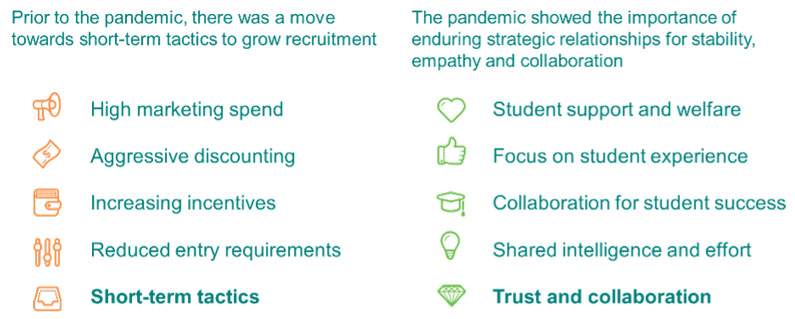Road to Recovery: Reason to be optimistic #5

While the pandemic continues to cause uncertainty for the mobility of international students and the short-term future of the global education sector, you could be forgiven for having a pessimistic outlook. However, our Road to Recovery work which considers global data trends from across the sector and insights from our own agent community, gives us reason to feel more confident about the recovery of international education.
In this series of Insights pieces, Jon Chew (Head of Strategic Insights and Analytics at Navitas) shares five reasons to be optimistic, which were initially shared at the Navitas Virtual Business Partners Conference held in January 2021.
Reason to be optimistic #5: International education will focus on strategic relationships over short-term tactics
In the increasingly competitive international education sector, institutions have sought to grow international student enrolments drawing on a wide variety of levers. Many would observe a growing use of short-term tactics designed to rapidly increase enrolments and market share. These include large marketing budgets, discounting, agent incentives and commission rates, and the relaxation of entry requirements. In the future, such tactics will continue to be part of the marketing toolkit, but there will be an increased focus on enduring, strategic relationships.
“We believe that to be successful… the best way forward is to work together. It is our belief at the university that the partnership working makes us stronger and that for both organisations to be successful, in-depth partnership is required.”
Prof Nishan Canagarajah, Vice Chancellor, University of Leicester, Navitas Business Partners Conference, January 2021.
The crisis of the pandemic has shown that such relationships are necessary if institutions are to deliver responsive student support and student welfare measures. In particular, collaboration, shared intelligence and sustained, coordinated efforts are built on a foundation of trusted relationships, and not transactional arrangements.
The focus on strategic partnerships will be sharpened as many institutions (and governments) seek reassurances that the next phase of growth is more resilient, diversified and sustainable so as to withstand future shocks.

This Insight article is one in a series of five reasons to be optimistic: Read the full article here.